‘Sport at all levels helps people come together, work as a team, push themselves, and achieve amazing things.’ Stonewall
England Ice Hockey are committed to providing an environment which seeks to encourage an open and diverse community. This is reflected in our values and behaviours where we respect the rights and dignity of all people whatever their background.
By consistently living our values we seek to eliminate those things that undermine or are harmful to anyone involved in the activities of the England Ice Hockey. We believe that unlawful discrimination, intimidation, or harassment of anyone connected with England Ice Hockey, specifically related to their race, religion or belief, age, gender reassignment, sex, sexual orientation, disability, marital or partnership status or maternity and pregnancy cannot be tolerated.
In addition, we strive to advance equality of opportunity and foster good relations between all people within England Ice Hockey. As an organisation we will provide an environment where people can address and debate differences and constantly reflect on practices.
England Ice Hockey aspire to be recognised by our communities and nationally, as an organisation that leads the way in publicly promoting the value of diverse cultures and our belief that these different experiences make our organisation a better place to play the sport, we all love.
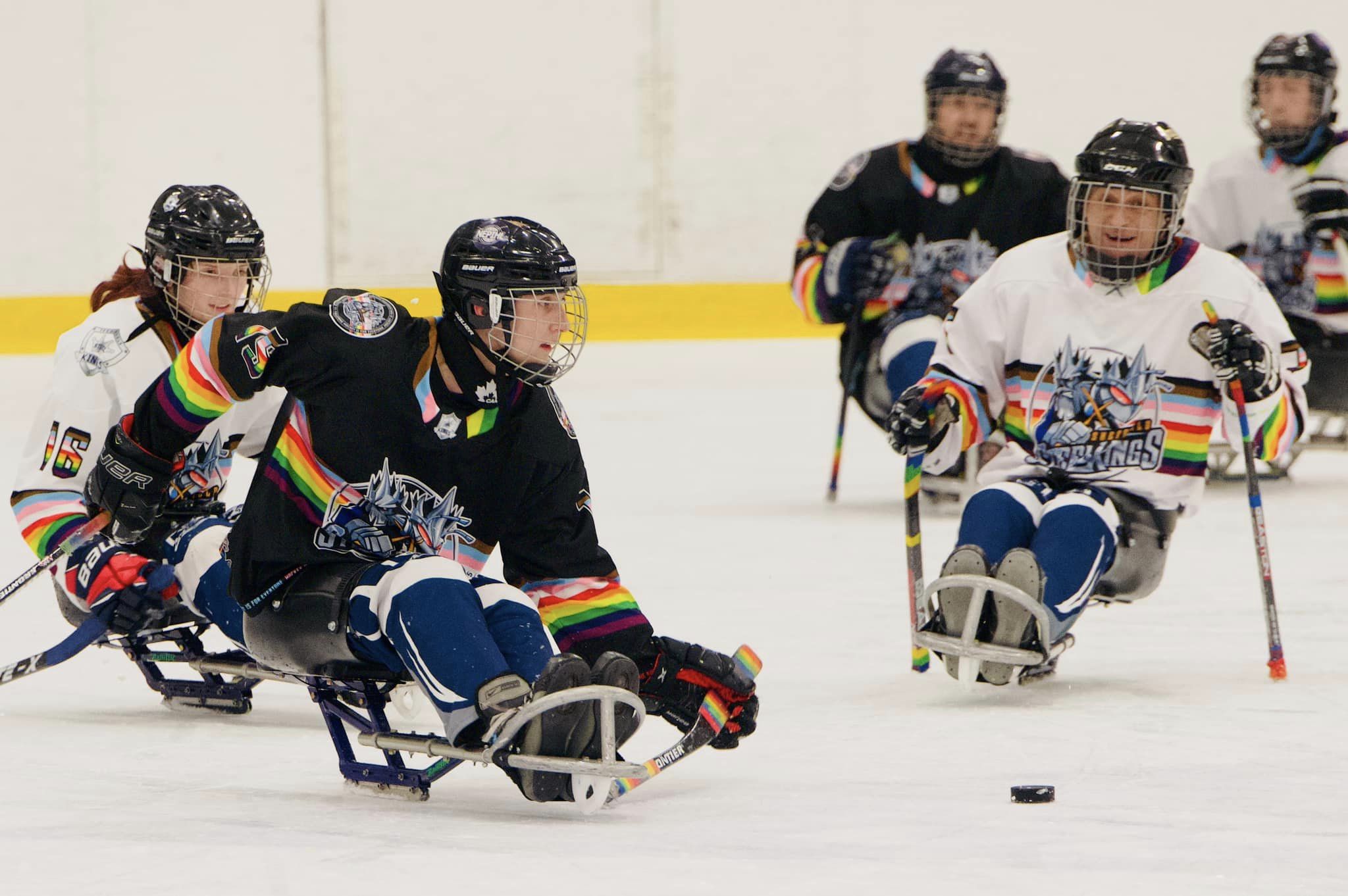
We aim to promote safe spaces for all in ice hockey and ensure all communities feel welcome in our sport. Our projects and programmes aim to remove the barriers that exist and prevent people accessing the sport. Below is some of the ways we are tackling this:
- Our governance and policies ensure we are committed to preventing discrimination within sport. Our EDI Committee work hard to ensure the sport is equitable, inclusive and diverse. Our diversity and inclusion action plan can be found here: England Ice Hockey Diversity and Inclusion Action Plan
- We have adopted a target of a minimum of 30% of each gender on our Board and strive to achieve greater diversity, including but not limited to, ethnically diverse communities and disability membership. We also actively support other areas of the sport to realise greater diversity in voluntary and paid roles.
- We work closely with GB Para Ice Hockey and the SEND ice hockey community to provide inclusive opportunities within the sport for those with disabilities.
- We provide resources, guidance and signposting to help our clubs and members to understand inclusion and to be able to apply inclusive practice across the whole sport.
- We work with Hockey is Diversity to provide education and guidance to our volunteers, and a confidential reporting system to tackle discrimination of all forms.
- We work in partnership with Pusckstop to provide a Netminder Development Programme which provides kit to those wishing to access the expensive sport of ice hockey.
 We are committed to increasing diversity within our community; creating an environment where everyone is welcome and accepted will help the sport thrive and help clubs become key community assets.
We are committed to increasing diversity within our community; creating an environment where everyone is welcome and accepted will help the sport thrive and help clubs become key community assets.
We understand the barriers people from ethnically diverse communities. As highlighted by Sport England, including negative experience in sport, unsuitable facilities, lack of representation, and stereotyping and aim to break these down by:
- Offering the opportunity to borrow kit through the Puckstop Netminder Development programme
- Providing activities for different genders
- Offering non-competitive participation events, such as development camps with Planet Ice
- Ensuring our organisation is underpinned by inclusive practices and procedures, and that these are embedded across the Association
- Educating our clubs and members in inclusion and diversity, and taking a no-tolerance approach to discrimination
- Providing clear, anonymous reporting through Hockey is Diversity
- Encouraging an ethnically diverse workforce
Useful links
https://www.sportsaid.org.uk/our-work/equality-diversity-and-inclusivity
https://www.youthsporttrust.org/resources/inclusion/ethnicity-and-faith-resources
We have an active Para Ice Hockey section and new SEND section within the England Ice Hockey umbrella. We actively support these sections and their clubs by providing a dedicated member of support staff, funding for international duty and an open forum to ensure equity within the organisation. You can find more about how to join here.
Our staff undertake Inclusive Activity Programme workshops, and we aim to include this as part of our coaching and education pathway.
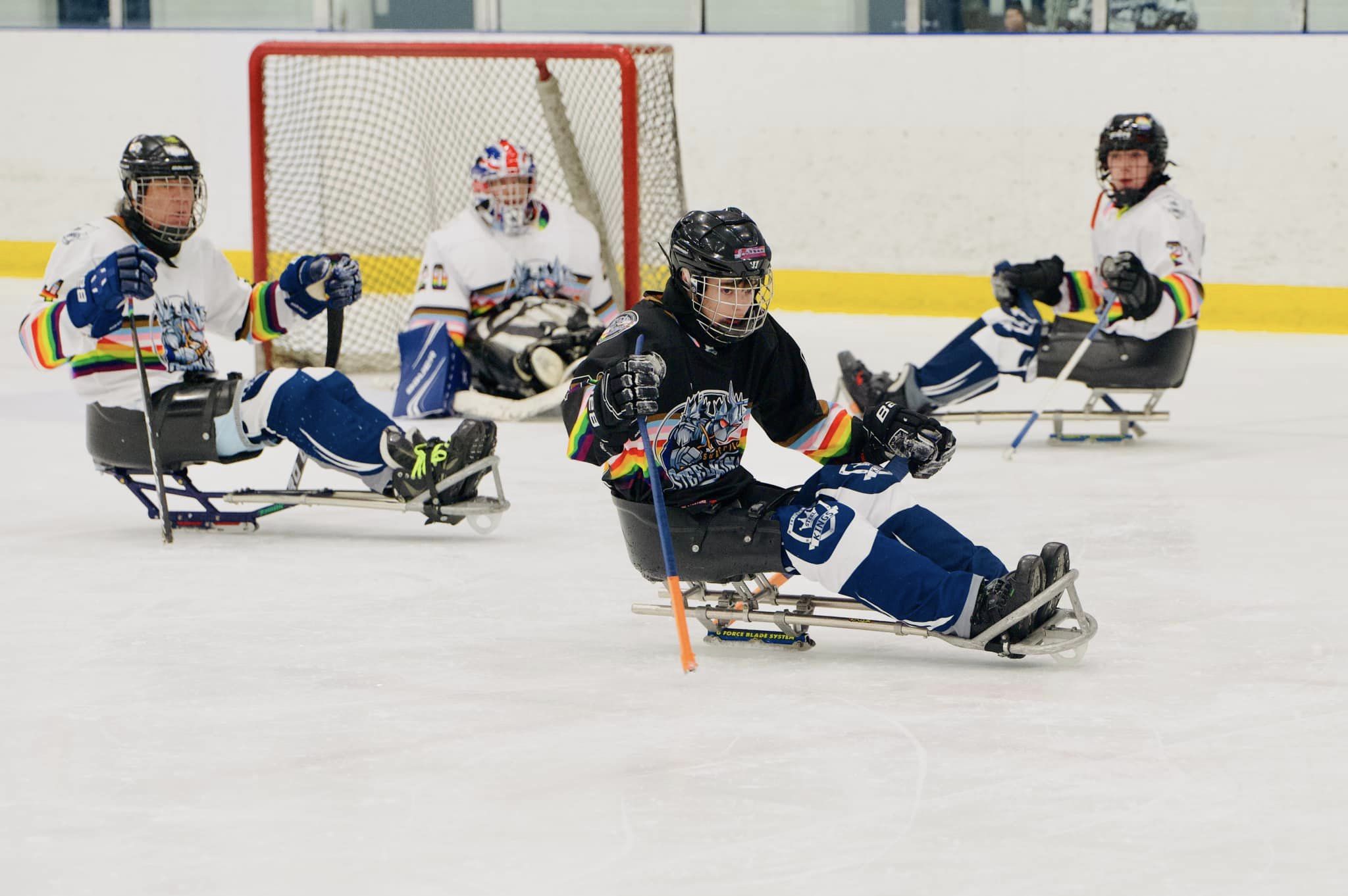
Para (Sledge) Ice Hockey
There are four regional Para Ice Hockey clubs affiliated with England Ice Hockey and all are fully inclusive – anyone can join, whether disabled or able-bodied.
England Ice Hockey also supports the Team GB and Team GB Women’s Para Ice Hockey teams as they compete internationally, with Team GB winning the gold medal at the Para Ice Hockey World Championships (Pool C) in 2022.
We help to organise on-ice officials for games and promote the British Para Ice Hockey League across England Ice Hockey’s social media pages.
SEND Ice Hockey
Unlike mainstream adult and junior league hockey, SEND ice hockey caters for children and adults of differing ages and abilities who have developmental disabilities. SEND hockey is non-contact, non-competitive and focuses on improving health and well-being.
Useful resources:
Activity Alliance is the leading voice for disabled people in sport and activity. Established in 1998 as a national charity, they were previously known as the English Federation of Disability Sport and provide a wealth of resources and support to close the gap between disabled people’s level of inactivity and that of non-disabled people.
Mencap offer a wealth of guidance and resources to support those with, working with or caring for people with a learning disability.
England Ice Hockey are committed to creating a safe, welcoming and enjoyable environment for all members of the LGBTQ+ community. Below are just some of the ways we are supporting our LGBTQ+ community.
Pride week
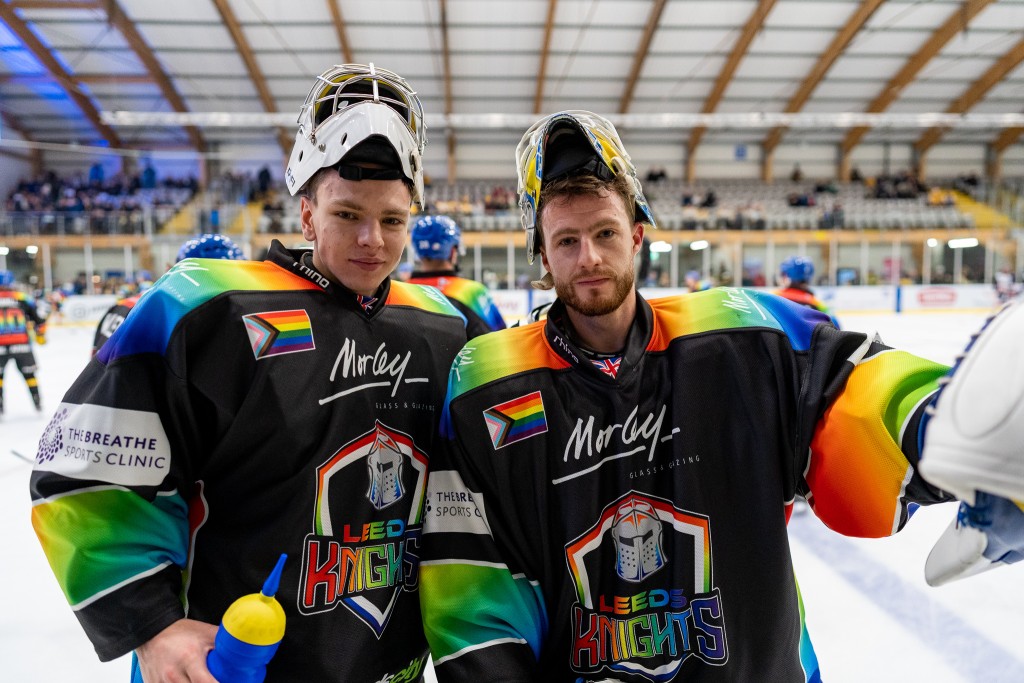
Every season England Ice Hockey hold a dedicated pride week, shining a light on LGBTQ+ diversity and inclusion and giving the ice hockey community a chance to step up and be an ally.
Clubs across the England Ice Hockey pyramid had the opportunity to show their collective strength against homophobia, transphobia and other forms of discrimination, wearing special pride jerseys to demonstrate their commitment, with many clubs also fundraising for LGBTQ+ charities.
In partnership with Hockey is Diversity, England Ice Hockey provide pride puck stickers to all clubs across the association.
Pride month
In June, England Ice Hockey joins the world in celebrating LGBT Pride Month, an annual event dedicated to the celebration and commemoration of LGBTQ+ communities all around the world.
How to be an inclusive club or organisation (taken from Stonewall)
Everyone will benefit if your club or organisation is more inclusive of lesbian, gay, bi, trans, queer, questioning and ace (LGBTQ+) people.
For many, sport and sporting environments are ‘safe spaces’ – somewhere they feel comfortable and at ease. But for others, the same place might make them feel like they have to hide part of their lives because of how others might react.
Follow these top tips to create a space where everyone feels they can be their authentic self. This way, they can spend all their energy and enthusiasm on their sport.
1. Celebrate
Letting everyone know you’re LGBTQ-inclusive doesn’t need to be complicated. You can show that you welcome everyone by making clear and visible statements, such as wearing rainbow stickers on your jerseys, celebrating different identities on social media, and displaying pride stickers visibly at your venues.
2. Policies
Sporting environments should be inclusive of all LGBTQ+ people, to make sure every opportunity is open to as many people as possible. Make sure your Club has an up to date inclusion policy (please see the template in our resources section at the bottom of this page).
Educate people in using the correct terminology, and embed this in all interactions and communication.
The England Ice Hockey Transgender Policy is currently under review, due for publication in January 2024. Should you have any questions in the meantime, please contact us.
3. Codes of conduct and ethos
Codes of conduct help everyone at the organisation know what behaviour is (and isn’t) acceptable. It is useful to include your organisation’s core values and make reference to your safeguarding, inclusion and anti-bullying policies. Putting the code of conduct on prominent display can act as a permanent reminder for club members.
Creating a safe and accepting space, allows people to:
- express themselves free from prejudice or judgement, which builds confidence and self-esteem
- feel valued and reassured through positive re-enforcement
- seek support and guidance if they should need it – support could also be extended to parents and peers
The England Ice Hockey Code of Conduct & Ethics can be found hereRules And Regulations.
4. Play
Some people may prefer to play in mixed-gender environments, so consider setting up mixed trainings, sessions, or tournaments where possible. If your organisation’s activities are already inclusive of all genders, you can make this clear by renaming your session to explicitly say ‘mixed’. Mixed activities can break down barriers and provide comfortable and inclusive opportunities for everyone.
5. Facilities
Consider what could be done to make your facilities more inclusive for all. For example, providing the option of gender-neutral facilities, and including a sanitary bin in all toilets. If you use third-party facilities, you might want to work with the managers to ensure gender-neutral spaces are available.
Being inclusive isn’t just the right thing to do – it has real benefits for you, your teammates, and your club. Inclusive approaches help:
- Recruit new participants and retains current ones, helping make your organisation sustainable.
- Attract new talent – participants will know they’ll be accepted for who they are and encouraged to reach their full potential.
- Create a welcoming environment, which makes your organisation a better place to work or volunteer. This will ensure your activities continue week in, week out.
Useful links:
For more information, please use the following resources:
https://www.stonewall.org.uk/our-work/campaigns/rainbow-laces
https://pridesports.org.uk
https://mermaidsuk.org.uk/wp-content/uploads/2021/03/Including-LGBT-young-people-in-sport1.pdf
https://thecpsu.org.uk/help-advice/topics/safeguarding-lgbtqplus-young-people/
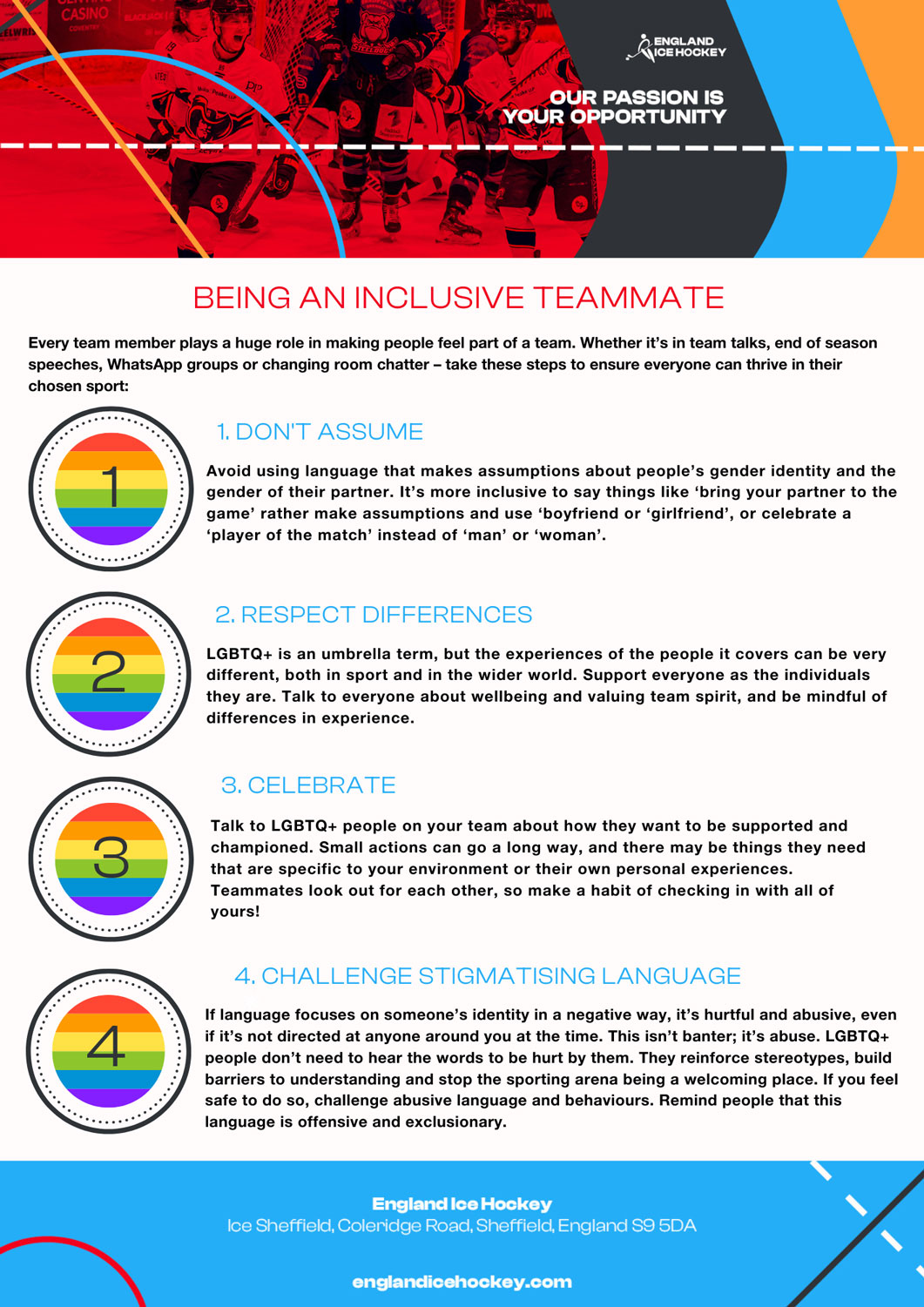
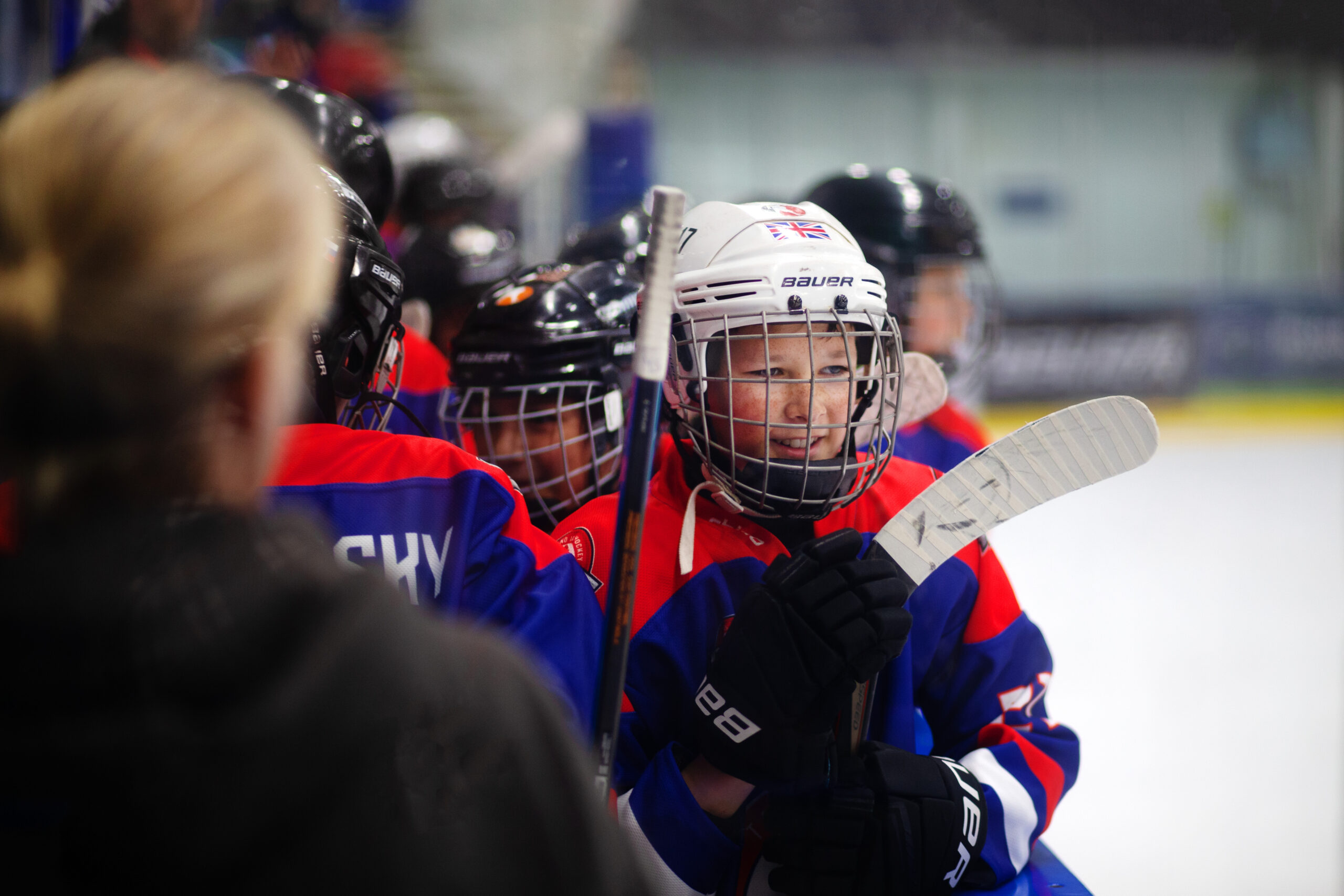
There’s lots of evidence that taking part in physical activity can have significant positive impact on mental wellbeing. Being physically active can impact mental health in the following ways:
- Improved sleep
- Lower risk of depression
- Improved mood
- Reducing stress and anxiety
- Increasing self-esteem
- Improving social connections
Like many team sports, ice hockey is a fantastic vehicle for building confidence and self-esteem on and off the ice, creating connections with teammates and clubs and getting those all-important endorphins.
We aim to promote the benefits of the sport on mental health, whilst remaining aware of the complexity of mental health disorders. With this in mind, we aim to educate our coaches, volunteers and participants around mental health, support clubs with making the sport accessible to those with mental health problems, and create awareness around the unique stressors sport can cause.
Unique stressors in sport
We all understand the positive impact physical activity can have on mental health, but, it’s also important that we are aware of the unique stressors in sport; these can be even more pronounced where elite athletes are concerned.
Some of the things that should be taken into consideration are:
- the pressure to perform
- comparisons with peers around ability, appearance or popularity
- maintaining, gaining, losing or ‘making’ weight to qualify or feel accepted in the sport
- the strain of finding, maintaining or potentially losing sponsorship or contracts
- an increased risk of online or cyber bullying, due to their raised profile
- dealing with media scrutiny and a lack of privacy
- balancing personal and professional commitments
- maintaining healthy relationships with peers
- coping with the transitions between grassroots to elite level sport and into retirement, either planned or unplanned
- the fear of injury and being put out of the game or forced to retire
- managing the emotional highs and lows of sporting careers
- sport being tied strongly with an individual’s identity – the risk here becomes apparent when young people leave sport and can feel a loss of this identity
Creating a healthy environment
We are committed to assisting clubs to create healthy environments within our sport, and support and encourage clubs to:
- train staff and volunteers in basic mental health awareness as part of our core education programme, with an ability to use the correct language and challenge discrimination
- ensure people have an understanding of the pressures of sport through education, safeguarding workshops and resources
- promote a welcoming, inclusive club that treats everyone from all race, faiths, genders and any other demographic markers, as an individual with their own needs
- develop safeguarding leads that feel confident they could identify and refer young people who are experiencing suicidal thoughts and feelings
- challenge and address instances of poor negative, aggressive, racist, homophobic, transphobic or sexist bullying behaviour amongst young people, and report this through Hockey is Diversity
- educate staff and volunteers through to ask how young people feel about taking part, listen to their answers and offer help and support if needed
- create an environment that respects its members and their feeling, through codes of conduct and education
- inspire a healthy competitiveness that embraces personal development as well as results or wins, promoting participation and a child-centred approach in our coaching programmes
- promote the details of mental health support services and making them available to young people
- ensure that everyone involved in the sports knows where and how to raise any serious concerns about a young person’s wellbeing, including internal reporting procedures, the NSPCC helpline and the police – if they believe a young person is at an immediate risk of harm
- educate athletes and volunteers in our talent pathway programme about mental health in elite sport
Useful links
https://www.mentalhealth.org.uk
https://www.mind.org.uk/about-us/our-policy-work/sport-physical-activity-and-mental-health/
https://www.mind.org.uk/media-a/4354/mental-health-and-elite-sport.pdf?ctaId=/about-us/our-policy-work/sport-physical-activity-and-mental-health/professionals-in-sport/slices/prof-sport/
https://thecpsu.org.uk/help-advice/topics/mental-health-and-wellbeing/#heading-top
https://www.ukcoaching.org/courses/elearning-courses/mental-health-awareness-for-sport-plus(included in our Coaching and Education pathway programmes)